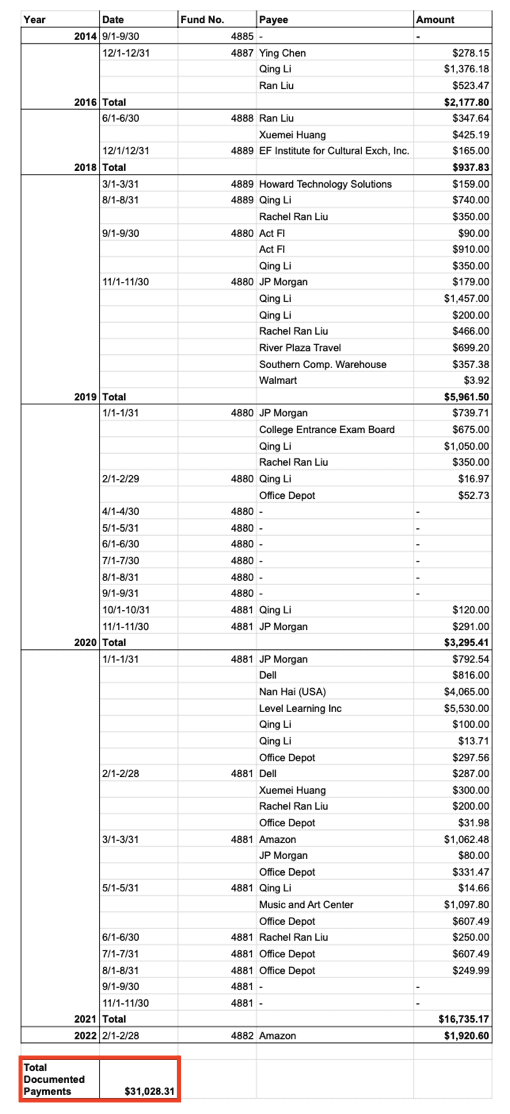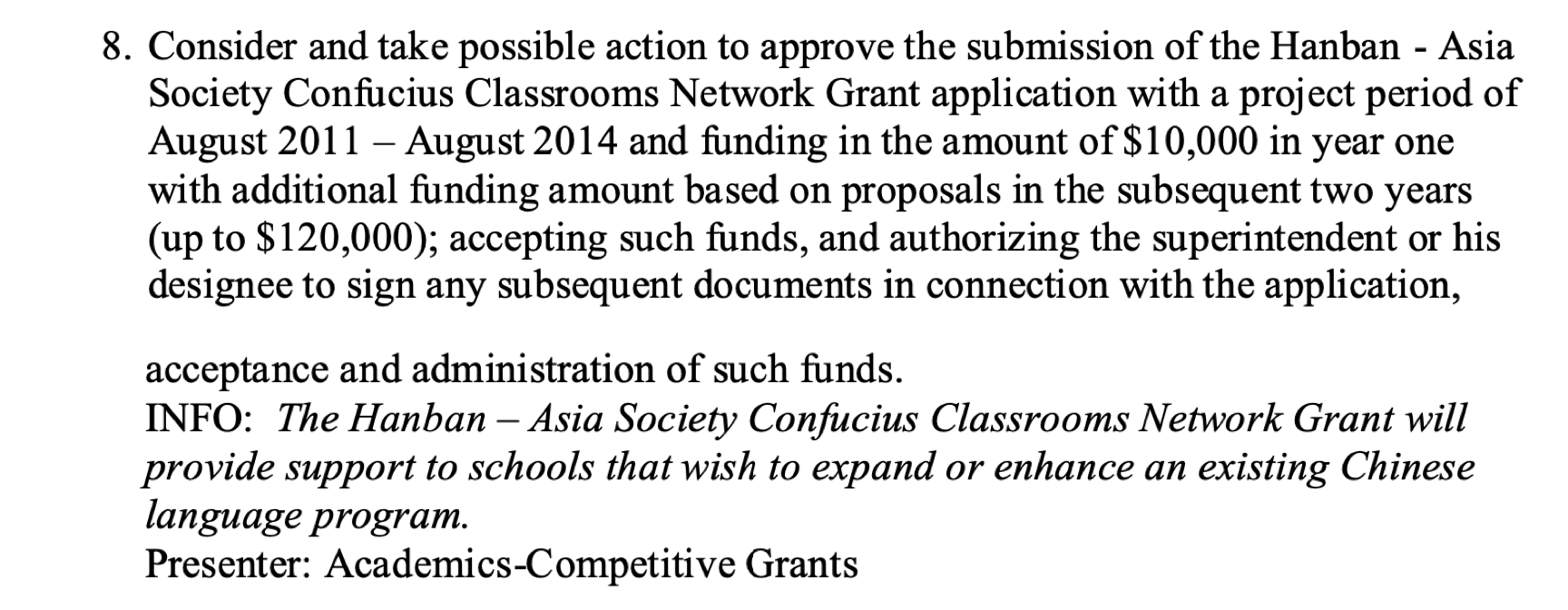Since 2020, citizens have become alarmed at home grown anti-citizen indoctrination efforts in Texas’ K-12 school districts. However, for years a hostile foreign government has also been inserting its ideology into the state’s education network.
Previously, Texas Scorecard reported on Chinese Communist Party (CCP) infiltration into various Texas universities through Confucius Institutes (CI). Although these were active for many years, CCP influence is not limited to higher education. It reaches all the way into the elementary classrooms in school districts across the nation and the Lone Star State.
Texas Scorecard examined several locations where Confucius Classrooms had been and still are active in the state’s independent school districts. The results are telling, and while by no means exhaustive, they reveal the CCP’s tentacles reach into Texas classrooms exist, and may be growing.
The College Board
In 2013, a unique Confucius Institute was established at Houston Independent School District (HISD). The agreement signed between Hanban—the CCP’s manager of the institutes—and HISD to establish a Confucius Institute is just as unique.
The contract allows HISD to establish a Confucius Institute and Confucius Classrooms under its authority. Hanban would provide the typical resources for the Institute (3,000 books, teaching materials, and a $150,000 startup fund) as well as an additional $10,000, and more educational materials for these Classrooms. HISD is responsible for managing and facilitating the activities of the Institute and its Classrooms, while regularly reporting to Hanban.
Unlike previous agreements, which were made directly between Hanban and the host university, this contract includes a third party: the College Board. Their involvement in the establishment of Confucius Institutes may come as a surprise to some, but this CCP connection is not new, as the College Board has maintained close ties with Hanban for several years.
In 2014, at an annual meeting of the National Chinese Language Conference (a regular project organized by the College Board in collaboration with Hanban and another organization known as the Asia Society), College Board President David Coleman said the following: “Hanban is just like the sun. It lights the path to develop Chinese teaching in the U.S. The College Board is the moon. I am so honored to reflect the light that we’ve gotten from Hanban.”
For the sake of context, remember that for the purpose of these programs and relationships, Hanban is the Communist Chinese government.
According to a report by the National Association of Scholars (NAS), the College Board has worked alongside Hanban on a number of projects in addition to Confucius Institutes.
In 2003, the College Board developed the Advanced Placement (AP) Chinese Language and Culture Test with assistance (financial and otherwise) from the Chinese government—namely, Hanban. In 2015, the College Board advertised an AP International Leadership Program, complete with a three-week trip to Beijing, funded almost completely by Hanban. Another major project was the Chinese Guest Teacher Program, a tool which placed Chinese language teachers in positions in the United States.
Incidentally, all guest teachers in the program were vetted, approved, and paid by Hanban. Other projects include the Chinese Bridge Delegation Program, the Chinese Language Assessment Institute, the annual National Chinese Language Conference, and more.
According to the NAS report, HISD and the College Board oversee six Confucius Classrooms, but the location of these classrooms is obscure. Kolter Elementary, an HISD member school, appears to be one of these classrooms, according to its website.

Other schools which appear to have ties to the Houston Confucius Institute are the Mandarin Immersion Magnet School, the Houston Academy for International Studies, Sharpstown International School, and an unknown number of others.
Several of these classrooms also receive support from an organization mentioned repeatedly in our earlier reporting: the Asia Society.
The Asia Society
The Asia Society is an organization with U.S. locations in New York and Texas, and has had many dealings with both the College Board and Hanban over the years. The Asia Society started a Confucius Classrooms Network in partnership with Hanban, through which they established classrooms across the country, including in the state of Texas. Kolter Elementary, International School of the Americas, Murchison Middle School, Sharpstown International, Houston Academy of International Studies, and the Ysleta Independent School District are all members.
Records obtained by Texas Scorecard from the Houston Independent School District reveal an interesting pattern of funding between 2013 and 2020.
In 2013, the Confucius Classroom at Sharpstown International School received $36,500 from the Asia Society in partnership with Hanban. In 2014, the same Asia Society grant funded Confucius Classrooms at Sharpstown International, Kolter Elementary, and Houston Academy for International Studies. Later that same year, Hanban and the College Board sent the HISD $128,923 for the Institute and three other Confucius Classrooms: Furr High School, Lamar High School, and Northline Elementary School. Another $80,000 was deposited by Hanban for the same schools in 2015. Over the following years, more deposits were made by the Asia Society Confucius Classroom Network Grant and by Hanban for many of the same schools.
Over the course of seven years, the HISD received nearly one million dollars to operate their Confucius Institute and Classrooms from Hanban, the College Board, and the Asia Society.
Unfortunately, the Asia Society Confucius Classrooms Network spread beyond HISD.
According to records obtained by Texas Scorecard from the North East Independent School District (NEISD) in Bexar County, the Asia Society had an agreement with the International School of the Americas, which was a member of the Confucius Classroom Network. From 2017 to 2020, the International School of the Americas received $25,871 from the Asia Society. They also received an unspecified amount of funding during the 2020-2021 school year.
In 2020, the College Board allegedly cut off all ties with Hanban. In a letter addressed to numerous U.S. senators, a College Board representative reported that the organization would no longer receive any grant funding from Hanban.
The College Board also issued this statement:
“It is also important to share that our work with Hanban has reduced in scope over time as schools and districts have succeeded in building their own Chinese language programs. Our agreement with Hanban concludes at the end of this year, and 2020 is the final year in which the College Board will receive or pursue any grant funding from Hanban.”
During the summer of 2021, the Asia Society released a statement saying they have:
“discontinued any affiliation with the Confucius Institute, Confucius Classrooms, and the Chinese Language Partner Network. In addition, the Asia Society’s Center for Global Education no longer accepts funding from Hanban, and the successor entities that continue its work in supporting Chinese language, including the Center for Language Education and Cooperation.”
The full impact of these decisions on HISD and its Confucius Institute remains unknown. According to email communications between NAS and them there are no current agreements between HISD and the new iterations of Hanban, the Chinese International Education Foundation (CIEF) and the Center for Language Education and Cooperation (CLEC).
However, no documents confirming the termination of the Confucius Institute and Confucius Classrooms program have been provided. Texas Scorecard recently requested communications from HISD relating to these programs. On July 12, 2022 that request was appealed to Texas Attorney General Ken Paxton. A ruling is still pending.
As for the schools which were members of the Asia Society Confucius Classroom Network, they were forced to find new host institutions. Prior to the termination, an Asia Society representative emailed all of the member schools, informing them of their options moving forward. They could either
- apply to become an independent Confucius Classroom,
- join a nearby Institute to become a Confucius Institute-affiliated Classroom, or
- collaborate with other Confucius Classrooms to establish a Confucius Classroom Coordination Office.
Independent Confucius Classrooms
Some schools, like the aforementioned International School of the Americas (ISA), did not ally themselves with other schools or universities, but sought to establish themselves as an independent Confucius Classroom. ISA is governed by the North East Independent School District in San Antonio.
According to email exchanges obtained by Texas Scorecard, the ISA contacted the Chinese International Education Foundation (CIEF) in order to connect with a partner university in China. As recently as March 2022, the ISA has been searching for partner universities with the help of the CIEF and another organization called the International Education Association Shanghai (IEAS). According to these communications, “after the IEAS finds [ISA] a partner school according to [its] need, the relevant parties can soon move on to the signing of the agreement and get the cooperation going.”
Clearly, although in a period of transition, this Confucius Classroom is alive and well.
Coppell Independent School District
Another example of how Confucius Classrooms are transferred when various host Institutes shut down can be found at the Coppell Independent School District (CISD), in Dallas County. Email communications obtained by Texas Scorecard reveal CISD has been a Confucius Classroom since June 2010. The precise organizational structure of the Classroom in its earlier stages is unknown, but in 2017, New Tech High School (NTH) within CISD signed a cooperation agreement with the Confucius Institute at the University of Texas at Dallas to establish a Confucius Classroom.
This was further confirmed by financial records Texas Scorecard obtained from CISD, showing $10,000 grants which the school district received annually from UTD from 2017-2019. In 2020, the district received $20,000 for the Confucius program, but the grantor was not identified in the records provided.
As was previously discussed, when Confucius Institutes close, affiliated Confucius Classrooms are forced to seek new host institutions. The Confucius Classroom at New Tech High is a prime example.
Communications received from CISD reveal the last Confucius Classroom meeting facilitated by the UTD Confucius Institute was held in August 2019, just before the Institute closed its doors. The main topic of discussion was the future of its Confucius Classrooms:
We are going to hold our last Confucius Classroom meeting on August 9 since Confucius Institute at UT Dallas will officially terminate its operation on August 31, 2019. The meeting will be held at 2:00pm-4:00 pm in the room JO4.102 at UTD. This meeting is very important because it is about the future of each Confucius Classroom.
CISD’s New Tech High found the perfect candidate in a new organization called the International Leadership of Texas Global.
International Leadership of Texas Global
The International Leadership of Texas Global is a non-profit organization that works alongside the International Leadership of Texas, a network of charter schools active throughout Texas. ILT Global manages 21 Confucius Classrooms in North Texas through its Confucius Classroom Coordination Office (CCCO), led by Yunchi “Helen” He.
The CCCO has participated in numerous Confucius events, including the aforementioned Chinese Bridge Program Competition organized by Hanban, and now by the CLEC.
According to an email exchange provided to Texas Scorecard by CISD, ILTexas signed a cooperation agreement with Hanban in November 2019 to establish the CCCO. Texas Scorecard has requested records and communications from ILTexas, but has yet to receive any responsive documents.
When Hanban was rebranded a couple years later, email communications obtained from CISD revealed that the CCCO at ILTexas Global informed member schools of the change, and introduced them to the Chinese International Education Foundation (CIEF). When the Chinese Coronavirus struck the United States, Hanban’s other successor – the Center for Language Education and Cooperation (CLEC) – pitched a new program to help Confucius Institutes and Classrooms hire Chinese language teachers. This program was also advertised to Confucius Classrooms affiliated with the CCCO at ILTexas Global.
There are no exhaustive lists of which schools belong to this network, but at least one of those schools appears to be the aforementioned New Tech High in Coppell, which signed a cooperation agreement with CCCO at ILTexas Global to establish a Confucius Classroom. The agreement confirmed that Hanban would provide the classroom with all necessary materials, along with $10,000 each year.
Records obtained by Texas Scorecard reveal that ILTexas Global transferred $9,200 to the Coppell ISD Confucius Classroom in 2021. Other budgets and financial reports were prepared and transmitted between the schools, ILTexas Global, and Hanban, but those documents were not provided.
This Confucius Classroom is confirmed as currently active. Further communications received from CISD advertised the most recent Chinese Bridge Competition as taking place April 30, 2022. This proves that Confucius Classrooms do not always die with their host Institute. Sometimes, they live on as partner schools with other organizations who have dealings with Hanban, like the International Leadership of Texas.
Unfortunately, New Tech High at CISD is just one of many examples. The exact number and identity of Confucius Classrooms operating in Texas is unclear, but there are more.
Several other K-12 schools participated in Confucius events hosted by ILTexas Global, many of which were ILTexas schools themselves, such as the ILTexas Keller Saginaw High School, ILTexas Windmill Lake Orme High School, ILTexas Garland High School, and ILTexas Katy Westpark High School. Others included LD Bell High School, Carroll High School, and John Paul II High School. Still others, like Ursuline Academy in Dallas, were mentioned in communications reviewed by Texas Scorecard, and have distant connections to Confucius Institutes.
Whether these schools also have active Confucius Classroom programs remains to be seen.
Hurst-Euless-Bedford Independent School District
Another confirmed Confucius Classroom program was discovered at Hurst-Euless-Bedford Independent School District (HEB ISD). On HEB ISD’s website, there is virtually no mention of such a program. However, disbursement records on that same website tell a different story.
Numerous charges allocated to a “Confucius Classroom” account reveal that the program is currently active, and has been since at least 2016. Over the years, the purchases allocated to this account have accumulated to over $31,000. Half of that amount was spent in 2021 alone.
Texas Scorecard aggregated and compiled data from multiple sections of HEB ISD’s website into the spreadsheet below:

We requested records and communications pertaining to their Confucius Classroom program from the school district, but these were not released before publication.
And still more CCP influence was uncovered in school districts around the state.
Ysleta Independent School District (YISD)
This school district surfaced during our investigation of Confucius Classrooms in Texas. One of their member schools, Eastwood Knolls International School, admits to being named a Confucius Classroom on its website. Furthermore, a 2011 board meeting agenda found on the YISD website enumerates the application for a Confucius Classroom grant from the Asia Society and Hanban as a point of discussion during the meeting:

Whether this application was approved and a Confucius Classroom was established has not been confirmed. Texas Scorecard requested relevant records and communications from YISD, but those were not received before publication.
Conclusion
Ultimately, the exact size and scope of the Confucius Classrooms network in Texas K-12 schools remains a mystery.
However, based on what was uncovered, it is safe to conclude Confucius Classrooms are not a relic of the past. They are very much an active part of public education in Texas. Discovering all participating schools will be a tall task, but one that is necessary in order to fully understand the extent of Chinese Communist Party influence in Texas public education. Clearly, it has spread beyond universities and begun to infect young minds as early as elementary school.
As Americans monitor the spread of these programs, they should also be watchful of new connections which universities are making with their Chinese counterparts. These connections may not involve a Chinese government bureau as a party to the agreements, but the influence exercised through these relationships must not be taken lightly.
In part four, we will explore the nature of these foreign connections, which were established before the Confucius Institutes were founded, and which will continue after they are long gone.





